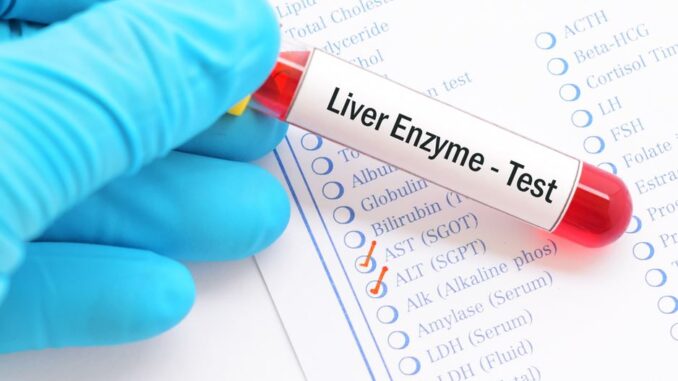
Checking the level of liver enzymes in the blood is a common test for both healthy and sick dogs. It’s a part of every pre-anesthetic, wellness, or illness blood panel. But what do the results mean?
Well, it could be any number of things ranging from absolutely nothing to an indication of a serious issue. Let’s take a look at what elevated liver enzymes in dogs look like and what could be the causes.
Key highlights:
– Liver enzymes are proteins produced by the liver and released into the bloodstream, and are indicators of liver function and health.
– Sometimes elevated liver enzymes can be seen in healthy animals, however they may also be associated with diseases affecting the liver or gallbladder, especially if your dog is also experiencing signs of illness.
– Elevated liver enzymes may be due to inflammation of the liver, toxin exposure, certain medications, congenital disease, cancer, cirrhosis, or other health conditions.
– A veterinary exam is always needed to determine the best treatment.
– Most elevations in liver enzymes will return to normal 2-4 weeks after resolution of the issue.
What are Liver Enzymes in Dogs?
Liver enzymes refers to a small assortment of different proteins produced by the liver that are released into the blood. These enzymes travel around the body doing lots of great things, such as metabolizing medications and breaking down toxins. These enzymes can be measured in the blood.
Why Do Dogs Get Elevated Liver Enzymes?
It’s not uncommon for elevated liver enzymes to be found on a perfectly healthy dog, especially young puppies or the very active and rambunctious types.
Elevated liver enzymes may also be found in otherwise healthy senior pups. These may just be readings on a blood test.
On the other hand, elevated liver enzymes may also show up in very sick dogs, such as those vomiting, having diarrhea, or that are yellow all over (jaundice). These dogs are more than likely having issues with their liver or gall bladder that is making them very sick.
Let’s not forget that elevated liver enzymes can be the result of certain medications, mainly steroids. In dogs that are taking steroids for anti-inflammatory reasons may show up with elevated liver enzymes. Dogs with Cushing’s may also have elevated liver enzymes due to the higher than normal amounts of steroids in their bodies.
When Are Elevated Liver Enzymes an Issue?
If liver enzymes are above what is normal, your vet will want to take a good look at your dog and may want to run additional tests to see if there are having a problem with their liver or elsewhere.
Elevated liver enzymes can be a cause for concern in particular when your dog is showing other signs commonly seen in dogs with liver problems:
- vomiting or diarrhea,
- abdominal pain,
- weight loss, and
- yellowing of the skin and eyes.
What Are the Potential Problems to Look Into?
Elevated liver enzymes have a wide range of causes, some of which are completely normal and others that are very serious:
1. Inflammation of the Liver
The liver is the filter of the body, so it’s no wonder that it can get inflamed from time to time. The cause of this inflammation may be due to a virus or bacteria or even obesity.
Two of those infectious causes of liver inflammation are infectious canine hepatitis and Leptospirosis, both of which can be vaccinated against.
How do you know if your dog has an inflammation of the liver:
Dogs with liver inflammation may show up with vomiting, diarrhea and abdominal pain. They may have an enlarged liver, fever, and jaundice. They will more than likely not be eating or not eating as much.
The liver is able to regenerate, so getting treatment early on can be very successful. Be sure to see your vet if you notice any of these symptoms.
2. Toxins
Again, being the filter of the body, the liver sees its fair share of toxins. Some of those toxins can be very harmful and even damaging to the liver. Xylitol, blue-green algae, and some mushrooms are the most common ones that can result in death.
How do you know if your dog has ingested toxins:
Vomiting, bloody diarrhea, abdominal pain, and jaundice may all be seen. Ingestion of these toxins requires immediate treatment or death may occur.
3. Medications
Steroids and phenobarbital can lead to an increase in liver enzymes. Of course, you’ll want to tell your veterinarian if your dog is using any medications so that they can rule this cause out.
Most of the time, the elevation in liver enzymes isn’t a big deal and will return to normal after discontinuing the medications.
4. Congenital
Elevated liver enzymes in puppies may be the result of issues with the makeup of the liver, gall bladder or bile duct (The most common would be a portosystemic shunt when the duct that was used to bypass the liver in utero fails to close.)
How do you know if your puppy’s issue are congenital?
Puppies with congenital liver problems often have poor growth, incoordination, disorientation, and seizures. Dogs may also inherit copper storage disease in which the liver cells become packed with excess copper, causing damage.
Most congenital liver issues are managed through diet and medications. Surgery may be used in some cases.
5. Tumors
Believe it or not, but not every tumor that grows on the liver is bad or dangerous. In fact, older dogs may develop benign nodular hyperplasia in which nodules develop on the liver that aren’t harmful. These may also elevate the liver enzymes.
On the other hand, the liver can also develop cancer, which is harmful. The most common cancers of the liver are lymphoma and hemangiosarcoma.
How do you know if your dog has a tumor that grows on the liver?
Dogs may show up with weight loss, not eating, abdominal pain, vomiting, or difficulty breathing or other signs if the cancer has spread. See your veterinarian for diagnosis and treatment. Tumors in the liver can be removed surgically.
6. Cirrhosis
Cirrhosis is a long-term liver issue where the liver gets scarred and becomes unfunctional. It can be caused by chronic infection or inflammation or toxins. This is a permanent issue where the liver is unable to regenerate.
Dogs with cirrhosis have weight loss and a decreased appetite along with elevated liver enzymes. Cirrhosis may be managed by treating the underlying cause and then offering support to the liver.
7. Others
Other issues that don’t directly involve the liver can also lead to elevated liver enzymes in dogs. Heart disease, diabetes, pancreatitis, and inflammatory bowel disease are just a few. These are going to present with their own unique signs, so be sure to see your vet any time something seems off with your dog.
Is There Anything I Can Do At Home to Help my Dog?
Before you start any at-home treatments for elevated liver enzymes, be sure you know what you’re treating. Always start with a veterinary visit to properly diagnose (and measure) a dog’s elevated liver enzymes. You don’t want to mess around with an at-home treatment when what your dog really needs is veterinary care.
Now, that being said, some dogs have chronic issues, such as copper storage disease, that may be helped by some at-home treatments. Of course, your veterinarian should be the one to recommend these products specifically for your dog’s condition. Those may include a diet change and liver support medications.
A couple of good ones include Denamarin and milk thistle. These include products that help the liver cells to regenerate and increase function. They can be used for chronic or acute issues, but should never be given without the sign off of your vet as they may not help with every liver condition.
How are Elevated Liver Enzymes Treated?
How your dog’s elevated liver enzymes get treated is going to depend on the cause. Some times treatment won’t be necessary. This is when the elevation is due to a growing puppy, an older dog with nodular hyperplasia, or an active pup that got too much exercise.
Dogs that are taking steroids or phenobarbital will likely be monitored with no treatment.
Other times, treatment may consist of antibiotics, anti-inflammatories and liver support for infectious disease. Fluids, hospitalization and a diet change may be needed for more severe cases.
Dogs that ingested a toxin may need decontamination with activated charcoal, fluids, and other supportive medications. Hospitalization is likely.
Liver tumors may require surgery +/- chemotherapy or radiation depending on whether the tumor is cancerous or not.
As you can see, there is a wide range of treatment options that vary from just monitoring to surgery. With that comes a wide range of costs. Costs for an exam and blood work may run about $100-$200, while surgery could be $1,000. Hospitalization for a severe infection may also cost in the $1,000 mark.
Types of Enzymes
The most common liver-specific ones that vets look at are ALT and AST. These enzymes are usually released in higher amounts when there is damage or inflammation in the liver in some form or another. Two other enzymes that are looked at are GGT and ALK. These are more closely related to the gall bladder and bile ducts, which are in close association with the liver. Again, these are found in higher amounts in the blood when there is damage to the gall bladder or bile duct, such as a blockage or stone.
It’s important to know that ALK and AST aren’t only found in the liver. Higher ALK could be the result of bone growth in puppies or certain medications, while elevated AST could be the result of strenuous exercise. Veterinarians know better than to contribute higher than normal levels of these enzymes to liver disease alone.
Frequently Asked Questions
Can elevated liver enzymes be temporary?
Yes. Some liver enzymes are also related to other areas of the body, such as AST and muscle and ALP and bone. Elevations in these liver enzymes may go up following strenuous exercise or growth and then return to normal. Liver enzymes may also increase temporarily with some medications. If your dog isn’t showing any other signs and elevations may be related to one of these possibilities, your vet may choose to monitor their liver enzymes without treatment.
Is it safe to continue giving regular medication to a dog with elevated liver enzymes?
This one is up to your veterinarian. Always be sure to let your vet know about any medications or supplements that you are giving your dog. From there, they can determine which medications are okay to continue and which you may want to stop.
How long does it take for liver enzyme levels to return to normal?
Depending on the cause of the elevated liver enzymes, most will return to normal levels within 2-4 weeks following resolution of the issue.
Are there any breed predispositions to elevated liver enzymes?
Some breeds may show elevated liver enzymes, mainly in ALK, and will not have any other signs. Those breeds are miniature Schnauzers, Scottish terriers and huskies. This is why it’s important to get a baseline value when your pup is good and healthy to know what their normal is.
Disclaimer: This website's content is not a substitute for veterinary care. Always consult with your veterinarian for healthcare decisions. Read More.


Be the first to comment